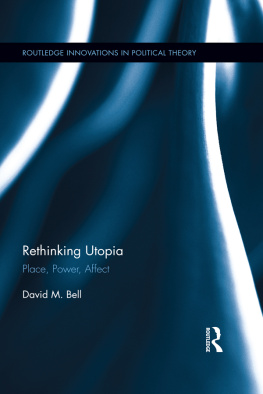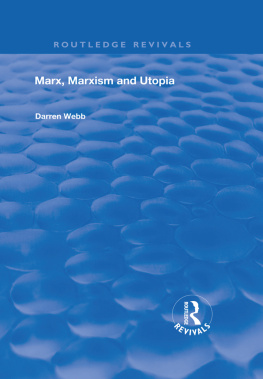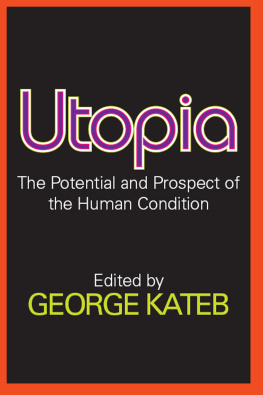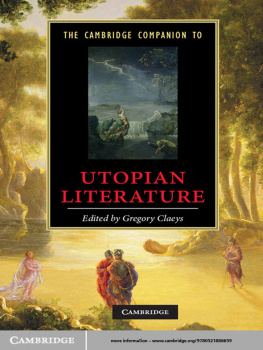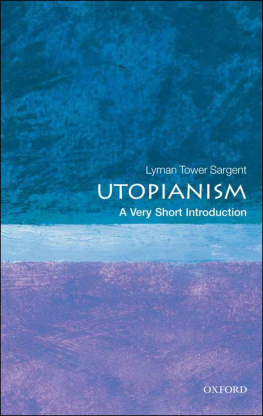David Bells is one of the most insightful and challenging new voices not only in utopian studies but more broadly in critical theory and cultural studies. In Rethinking Utopia: Place, Power, Affect , he conjoins his engaged theoretical analysis with his political, performative, and pedagogical experience and delivers a deeply considered, and truly dialectical, re-functioning of the utopian problematic that will enable both scholars and activists to work with and in the process of utopian transformation in affective and structural ways. Put aside your reading lists, and turn to this bookand in doing so prepare to have your critical paradigm shifted.
Tom Moylan , Glucksman Professor Emeritus and Founding Director of the Ralahine Centre for Utopian Studies at the University of Limerick
David Bells book stands out among recent contributions to the field of utopian studies for its theoretical sophistication and originality. The excellent discussion of utopia as place is particularly noteworthy. I warmly recommend this work to all those interested in rethinking utopia as a tool for self-critical radical political thought in the twenty-first century.
Dr. Laurence Davis , University College Cork, editor of Anarchism and Utopianism (2014) and The New Utopian Politics of Ursula K. Le Guins The Dispossessed (2005)
Rethinking Utopia
Over five hundred years since it was named, utopia remains a vital concept for understanding and challenging the world(s) we inhabit, even inor rather because ofthe condition of post-utopianism that supposedly permeates them. In Rethinking Utopia David M. Bell offers a diagnosis of the present through the lens of utopia and then, by rethinking the concept through engagement with utopian studies, a variety of radical theories and the need for decolonizing praxis, shows how utopianism might work within, against and beyond that which exists in order to provide us with hope for a better future.
He proposes paying a subversive fidelity to utopia, in which its three constituent terms: good (eu), place (topos), and no (ou) are rethought to assert the importance of immanent, affective relations. The volume engages with a variety of practices and forms to articulate such a utopianism, including popular education/critical pedagogy; musical improvisation; and utopian literature. The problems as well as the possibilities of this utopianism are explored, although the problems are often revealed to be possibilities, provided they are subject to material challenge.
Rethinking Utopia offers a way of thinking about (and perhaps realizing) utopia that helps overcome some of the binary oppositions structuring much thinking about the topic. It allows utopia to be thought in terms of place and process; affirmation and negation; and the real and the not-yet. It engages with the spatial and affective turns in the social sciences without ever uncritically being subsumed by them; and seeks to make connections to indigenous cosmologies. It is a cautious, careful, critical work punctuated by both pessimism and hope; and a refusal to accept the finality of this or any world.
David M. Bell is a Research Associate at Newcastle University, where he works on the Imaginaries of the Future network.
Routledge Innovations in Political Theory
For a full list of titles in this series, please visit www.routledge.com
62 Political Philosophy, Empathy and Political Justice
Matt Edge
63 The Politics of Economic Life
Martin Beckstein
64 The Temporality of Political Obligation
Justin C. Mueller
65 Epistemic Liberalism
A defence
Adam James Tebble
66 Hegel, Marx, and 21st Century Social Movements
Democracy, dialectics, and difference
Brian Lovato
67 Ideologies of Experience
Trauma, failure, and the abandonment of the self
Matthew H. Bowker
68 Post-Politics in Context
Ali Rza Takale
69 Claus Offe and the Critical Theory of the Capitalist State
Jens Borchert and Stephan Lessenich
70 Equality Renewed
Christine Sypnowich
71 Rethinking Utopia
Place, Power, Affect
David M. Bell
First published 2017
by Routledge
711 Third Avenue, New York, NY 10017
and by Routledge
2 Park Square, Milton Park, Abingdon, Oxon, OX14 4RN
Routledge is an imprint of the Taylor & Francis Group, an informa business
2017 Taylor & Francis
The right of David M. Bell to be identified as author of this work has been asserted by him in accordance with sections 77 and 78 of the Copyright, Designs and Patents Act 1988.
All rights reserved. No part of this book may be reprinted or reproduced or utilised in any form or by any electronic, mechanical, or other means, now known or hereafter invented, including photocopying and recording, or in any information storage or retrieval system, without permission in writing from the publishers.
Trademark notice: Product or corporate names may be trademarks or registered trademarks, and are used only for identification and explanation without intent to infringe.
Library of Congress Cataloging-in-Publication Data
A catalog record for this book has been requested
ISBN: 978-1-138-89133-3 (hbk)
ISBN: 978-1-315-70969-7 (ebk)
Typeset in Times New Roman
by Apex CoVantage, LLC
An important claim of this book is that the individual is not given: it is a figure abstracted from permanent social processes of individuation. Thought (or theory), in this sense, should not be understood as the product of individuals locked away in their studies struggling to write through the incessant, untranslatable demands of cats who insist on walking across their keyboard ( guys, just what is it that you want? ), biological functions and the constant urge to procrastinate. The norms of academia, authorship (and our society more broadly), however, disagree: thought is associated with individuals, whose names appear on the cover of their book and who is (in theory, at least) able to reproduce themselves through the thinking that appears within it. So I want to be particularly clear here: the David M. Bell who appears on the cover of this book is not synonymous with me: this book is a snapshot of how thought has crystallized in and around me at a particular moment in time (or, more accurately, across a particular period in time: there are, no doubt, ambiguities, contradictions and inconsistencies in this work, and these may prove productive). That thought is not mine, but is profoundly socialthe product of a general intellect that is privatized and enclosed in various ways but somehow finds a way to become social once more. That social thought (re)produces me as much as I (re)produce it.
The rethinking that goes on in this book, then, has been produced through numerous encounters: with academic thought (inside and outside of utopian studies); through musical improvisation and radical experiments in education; through political struggle; and through numerous conversations. The academic practice of citation is, of course, one way to make this clear, but it works only for specific resonances and does not capture the social conditions of a works production. Rethinking utopia is a task that should befall all of us, and indeed this is very often the case. I must thank, then, the killjoys, utopians, anarchos, queers and angry, loving communists I have been lucky enough to engage withboth in real life and on Twitter. Yours is a solidarity and understanding far greater than can be understood at the moment.

